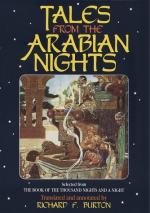[FN#124] In Al-Mas’udi the Caliph exclaims, “Verily thou hast received a visit from Satan!”
[FN#125] Al-Mas’udi, chapt. cxix. (Fr. transl. vii., 351) mentions the Banu Odhrah as famed for lovers and tells the pathetic tale of ’Orwah and ’Afra.
[FN#126] Jamil bin Ma’amar the poet has been noticed in Vol. ii. 102; and he has no business here as he died years before Al-Rashid was born. The tale begins like that of Ibn Mansur and the Lady Budur (Night cccxxvii.), except that Mansur does not offer his advice.
[FN#127] Arab. “Halumma,” an interjection=bring! a congener of the Heb. “Halum”; the grammarians of Kufah and Bassorah are divided concerning its origin.
[FN#128] Arab. “Nafs-i” which here corresponds with our canting “the flesh” the “Old Adam,” &c.
[FN#129] Arab. “Atmari” used for travel. The Anglo-Americans are the only people who have the common sense to travel (where they are not known) in their “store clothes” and reserve the worst for where they are known.
[FN#130] e.g. a branch or bough.
[FN#131] Arab. “Rayah kaimah,” which Lane translates a “beast standing”!
[FN#132] Tying up the near foreleg just above the knee; and even with this a camel can hop over sundry miles of ground in the course of a night. The hobbling is shown in Lane. (Nights vol. ii., p. 46.)
[FN#133] As opposed to “Severance” in the old knightly language of love, which is now apparently lost to the world. I tried it in the Lyrics of Camoens and found that I was speaking a forgotten tongue, which mightily amused the common sort of critic and reviewer.
[FN#134] More exactly three days and eight hours, after which the guest becomes a friend, and as in the Argentine prairies is expected to do friend’s duty. The popular saying is, “The entertainment of a guest is three days; the viaticum (jaizah) is a day and a night, and whatso exceedeth this is alms.”
[FN#135] Arab. “’Ashirah.” Books tell us there are seven degrees of connection among the Badawin: Sha’ab, tribe or rather race; nation (as the Anazah) descended from a common ancestor; Kabilah the tribe proper (whence les Kabyles); Fasilah (sept), Imarah; Ashirah (all a man’s connections); Fakhiz (lit. the thigh, i.e., his blood relations) and Batn (belly) his kith and kin. Practically Kabilah is the tribe, Ashirah the clan, and Bayt the household; while Hayy may be anything between tribe and kith and kin.
[FN#136] This is the true platonic love of noble Arabs, the Ishk ’uzri, noted in vol. ii., 104.
[FN#137] Arab. “’Ala raghm,” a favourite term. It occurs in theology; for instance, when the Shi’ahs are asked the cause of such and such a ritual distinction they will reply, “Ala raghmi ’l-Tasannun”: lit.=to spite the Sunnis.
[FN#138] In the text “Al-Kaus” for which Lane and Payne substitute a shield. The bow had not been mentioned but— n’importe, the Arab reader would say. In the text it is left at home because it is a cowardly, far-killing weapon compared with sword and lance. Hence the Spaniard calls and justly calls the knife the “bravest of arms” as it wants a man behind it.




